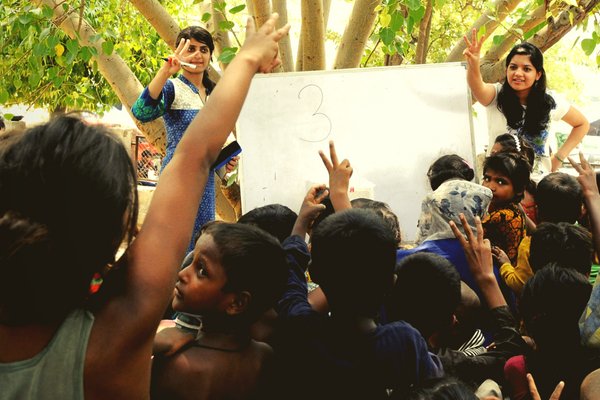In my recent visit to Bangalore, I went to meet slum dwellers near Marathhalli, in the Mahadevpura Constituency, who are mainly construction workers, domestic workers, and rag pickers hailing from districts of Nadia, Murshidabad of West Bengal. According to the 2011 Census report, Karnataka’s migrant population was 2.5 crore which is a humongous figure for any state. Being predominantly a slum area, it is home to approximately 10,000 migrant workers with no proper arrangement of residence, sanitation, water supply, or electricity. Making a livelihood is a nightmare for these labourers, but one need in particular remains a distant dream—education for their children.
As they have migrated from West Bengal, most of their kids had their primary education in Bengali-medium schools under the West Bengal government. Therefore, these kids face difficulty in getting accustomed to Kannada. As a result, they feel repulsed by these new Kannada-medium schools as they know nothing about the basics of Kannada and they are gradually joining the league of school drop-outs. Moreover, for parents, the existing government schools, being so far from their residence, are of no use. This is for two reasons—one, they always fear their children will face physical harm, abuse, and even kidnapping on their way to school because they are migrants and ‘outsiders’; and two, the language barrier. The children have habit of speaking in their mother tongue (Bengali), they do not have a command over Kannada, which is required to enter the mainstream education system of Karnataka.
Migrant labourers remain neck-deep in poverty without any social security with episodic engagement of their children in rag-picking work, which takes away the interest to get education from both parents and children. So spending a whole day going to school isn’t a priority. It is an undeniable fact that in families where economic conditions are the worst, one head is equal to one means of earning.
Migration And Child Labour: A Reality Check
The issue of migrant labour is yet to be officially recognized by the Government of India as it has not ratified the International Labour Organization Convention 097 (C097), concerning Migration Employment. It is a shame that India is the founder member of the International Labour Organization but ironically as a nation we do not have any provision to address the plight of migrant labours.
Whereas on Child labour, even after India’s ratification of the International Labour Organization Convention 138 and 182 on Child labour, the children of the slum continue to work as rag-pickers, and garbage cleaning workers. It shows the disheartening and sad picture of our countrymen who are compelled to leave their home due to economic limitations and suffer without an end in sight. Despite the law, this unending hardship continues under pin-drop silence from the public.
A Ray Of Hope
Since January 2018, young professionals of the city from different areas of work like IT sector and fields like teaching healthcare have begun lending an unconditional helping hand to the slum population. Pother Dabi, a progressive youth organization within city of Bangalore, is carrying out a collective effort to engage with these 10,000 Bengali migrant workers. This organization is not an NGO, a Trust, nor a CSR initiative of any corporate company. The aim behind the name remains very interesting and significant as “Pother Dabi” is the name of a famous bestselling Bengali novel of Sarat Chandra Chattopadhyaya, which he wrote in 1926. This novel, which was banned by the British Raj, narrates the story of a revolutionary who, hardened by his struggles and always on the run from the authorities, directly confronted the oppressive colonial rule. The message of the novel provides the prototype for these young professionals to make a platform and to take a stand for a cause.
The volunteers of Pother Dabi belong to the Bengali community, and can communicate with the migrant population in Marathhalli. They have taken this initiative with a motive to stand by the oppressed, safeguarding their basic rights, and fulfilling needs like education for their children. The wholesome effort is to bring children (who have episodic engagement as child labour) back into fold of education. Pother Dabi’s primary activity includes these professionals providing the children classes on English and Mathematics during weekends. Though they feel these efforts aren’t sufficient to make these children enter into mainstream education system but reactivating their interest in studies remains the immediate priority.
The above mentioned effort also reminds me of the steps taken by the government of Kerala for its own 25 lakh-strong migrant population. It has provided health insurance to millions of migrant workers with free medical service, along with ensuring them minimum wage. The government decided to publish “Hamari Malayalam”, a textbook to teach migrant labourers Malayalam, the predominant language of the state.
Safety, social security, and education for the migrant population remains a definite task of the state government. A society of individuals or groups with compassion, and feelings of fraternity towards migrant workers is undoubtedly a welcome gesture, but at the same in a democracy the elected representative and the government has a bigger responsibility to serve the needy and marginalized section of society be it a native or a migrant population. The inclusive participation of Bengali residents or anyone from city the of Bangalore to empower slum dwellers should be encouraged by all and the government of Karnataka too.
I hope these migrant workers from West Bengal in city of Bangalore get the facilities which they need to lead a decent life.
